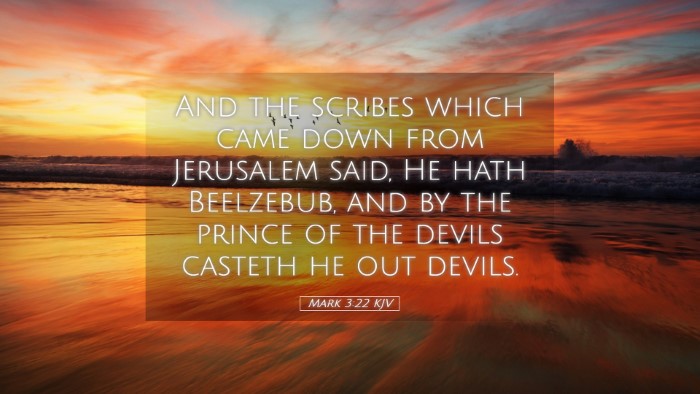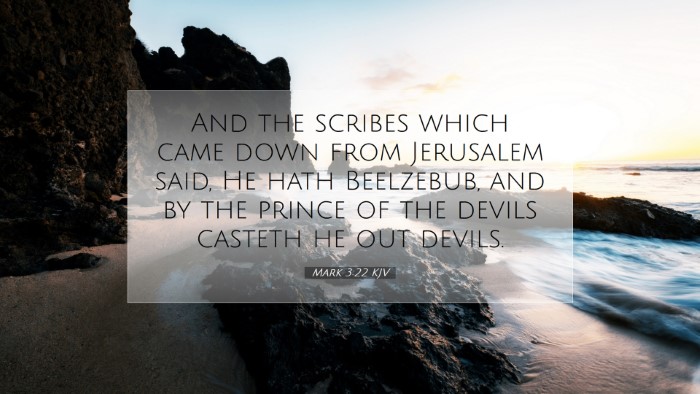Commentary on Mark 3:22
Mark 3:22 states: "And the scribes which came down from Jerusalem said, He hath Beelzebub, and by the prince of the devils casteth he out devils." This verse reveals a significant moment in the ministry of Jesus, particularly as perceived by the religious authorities of His day. The implications of this accusation are profound, inviting a deeper examination of the context and response.
Contextual Background
In the Gospel of Mark, the conflict between Jesus and the religious authorities escalates. Here we see the scribes, who were experts in the Law, coming down from Jerusalem specifically to challenge Jesus’ authority and actions. Their accusation that Jesus casts out demons by the power of Beelzebub—a name sometimes associated with Satan—suggests a willful misunderstanding and misrepresentation of His work.
The Accusation: An Examination
The scribes’ claim that Jesus has Beelzebub implies that they attribute His miraculous powers to evil rather than divine authority. Albert Barnes notes that this accusation reflects a desperate attempt by the scribes to undermine Jesus' growing influence. They could not deny His miraculous acts, so instead, they attributed them to malevolent forces.
- Authority Challenged: The scribes represented the established religious order, which perceived Jesus as a threat to their authority.
- Satanic Attribution: By connecting Jesus to Beelzebub, they attempted to turn the people’s perception against Him, portraying Him as an agent of chaos rather than a servant of God.
- Call to Discernment: This verse serves as a reminder to discern the source of spiritual authority. Adam Clarke emphasizes that attributing God’s work to the devil is a grave error, as it reflects a hardened heart towards divine truth.
Theological Implications
Matthew Henry provides a rich theological perspective on this passage, emphasizing that the opposition from the scribes represents a broader spiritual struggle between good and evil. He states that attributing the works of the Holy Spirit to demonic forces reveals a spiritual blindness that is often rooted in pride and jealousy.
Understanding Beelzebub
Beelzebub, often interpreted as "Lord of the Flies," symbolizes chaos and corruption. The choice of this name by the scribes indicates their intent to depict Jesus as working for the forces of evil, a move that Clarke argues is both ironic and misguided, as Jesus is ultimately the one who brings order and healing where there is chaos.
Jesus’ Response
While Mark 3:22 details the accusation, it sets the stage for Jesus' subsequent response, recorded in verses 23-30. This response is critical for understanding the nature of His ministry and the severity of the accusation levelled against Him:
- Logically Inconsistent: Jesus poses the rhetorical question, “How can Satan cast out Satan?” which highlights the inherent contradiction in the scribes’ logic. A kingdom divided against itself cannot stand.
- Authority of Jesus: Through this interplay, Jesus affirms His authority over demonic forces, emphasizing that His actions are a demonstration of God's kingdom breaking into the world.
- Warning against Blasphemy: Later, Jesus warns of the unforgivable sin of blasphemy against the Holy Spirit, suggesting that rejecting the Spirit's work is a dangerous path that leads to spiritual perdition.
Practical Applications for Ministry
For pastors, students, and theologians, Mark 3:22 invites reflection on the nature of spiritual authority and the reactions of those who feel threatened by God’s work:
- Vigilance Against Misattribution: As spiritual leaders, there is a need for vigilance in discerning the work of God in various contexts, resisting the urge to attribute it to evil. This requires deep spiritual insight and humility.
- Responding to Opposition: Jesus’ example teaches that when faced with opposition, it is vital to respond with truth and clarity, anchoring discussions in sound doctrine and reasoning.
- Encouraging Openness: Building a culture that encourages questioning and openness to the working of the Holy Spirit can help prevent the spiritual blindness exemplified by the scribes.
Conclusion
Mark 3:22 serves as a critical reminder of the tensions that can arise when divine authority confronts established norms. The accusations against Jesus by the scribes reveal a resistance to the transformative power of God’s kingdom. As we continue to engage with this scripture, let us remain committed to recognizing and affirming the work of the Spirit, safeguarding against the misattributions that can arise from spiritual pride and fear. In doing so, we open ourselves to the fullness of God’s revelation and the profound implications for our faith and practice.


